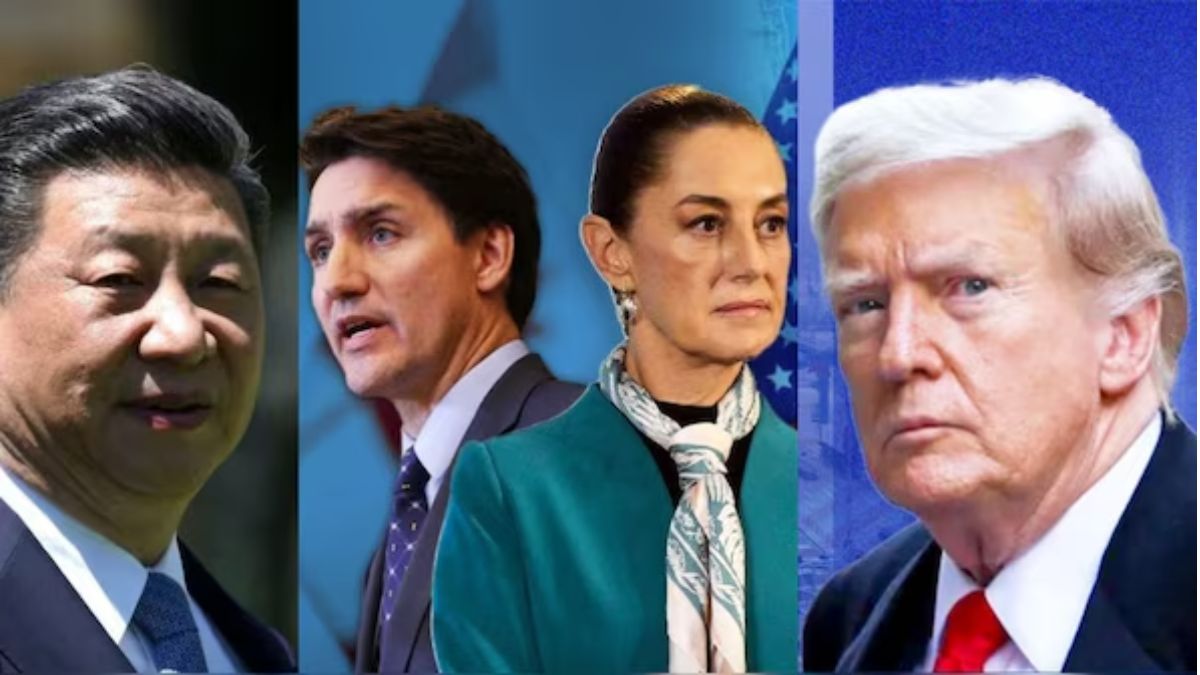Donald Trump has long positioned himself as a “tariff man,” advocating for aggressive levies on imports from countries he claims have harmed the US economy. In the second week of his presidency, Trump took bold steps to implement this vision, placing economic nationalism at the forefront of his agenda.
From his Mar-a-Lago estate, the 78-year-old president imposed new tariffs on imports from Canada, Mexico and China, following threats of similar levies on the European Union. Trump is betting that his trade tactics will pressure US partners into compliance without sparking further inflation, as many Americans remain concerned about the cost of living.
This aggressive move sets the stage for intense negotiations with countries across the globe, tackling issues such as trade deficits, currency policie, and even immigration. The ripple effect could shake financial markets and disrupt international commerce.
“These tariffs herald a new era of US trade protectionism that will affect all American trading partners, whether rivals or allies, and will significantly disrupt international commerce,” Eswar Prasad, a professor at Cornell University told the Financial Times.
Is America stuck in a trade war?
Trump once famously posted on social media that “trade wars are good, and easy to win” — a claim that he’s now putting to the test against Canada and Mexico after imposing tariffs that within hours led to retaliatory measures by those two countries.
Trump said the tariffs are about stopping the illicit smuggling of fentanyl, as well as preventing illegal immigration on the U.S. borders with Mexico and Canada. The president on Saturday put 25% tariffs on imports from Mexico and Canada, with a lesser 10% rate on Canadian oil, natural gas and electricity. China faces a 10% tariff.
Those moves almost immediately angered Mexico and Canada, America’s two largest trading partners who had previously negotiated a deal with Trump during his first term. Both levied retaliatory tariffs. Hockey fans at the Ottawa Senators game in Canada booed the U.S. national anthem. The Canadian prime minister, Justin Trudeau, encouraged his citizens to buy Canadian.
Impact Shorts
More ShortsTrump’s orders also suspended exemptions allowing low-value imports from the three countries to enter the US duty-free. The announcement threatens upheaval across supply chains, from energy to automobiles to food.
China shrugs off new Trump tariffs but bruising trade war looms
Trump’s new tariffs will probably not have a major impact on China’s economy but may herald the opening salvo of another bruising trade war with Beijing, analysts said Sunday.
Given Beijing had already factored in higher tariffs this year, the move was “unlikely to change the market expectation on China’s macro outlook”, Zhang said.
“I don’t think China needs to take action, such as exchange rate depreciation, to offset (the impact),” he added.
According to Bloomberg Economics, the 10 percent levy could knock out 40 percent of Beijing’s goods exports to the US, affecting 0.9 percent of Chinese GDP.
That is a small fraction of China’s vast economy, but it would put extra pressure on policymakers already grappling with slowing growth, a property sector crisis, and sluggish domestic consumption.
Canada will hit US with retaliatory tariffs: Trudeau
Prime Minister Justin Trudeau said that Canada will hit back at US tariffs with 25 percent levies of its own on select American goods.
“Canada will be responding to the US trade action with 25 percent tariffs against Can$155 billion ($106 billion) worth of American goods,” he said in a dramatic tone as he warned of a fracture in longstanding Canada-US ties.
The first round of tariffs would target Can$30 billion worth of US goods on Tuesday followed by further tariffs on Can$125 billion worth of products in three weeks.
“We’re certainly not looking to escalate. But we will stand up for Canada, for Canadians, for Canadian jobs,” Trudeau said.
The tariffs will apply to “everyday items” such as American beer, wine and bourbon as well as fruits, vegetables, consumer appliances, lumber and plastics, he added – “with much, much more.”
Canadian exports to the United States will face a 25 percent tariff starting Tuesday, although energy resources from Canada will have a lower 10 percent levy.
Trudeau said the trade conflict will have “real consequences” for Canadians but also for Americans, including job losses, higher costs for food and gasoline, potential shutdowns of auto assembly plants, and impeded access to Canadian nickel, potash, uranium, steel and aluminum.
Mexico vows retaliation
Mexican President Claudia Sheinbaum on Saturday ordered retaliatory tariffs in response to the U.S. decision to slap 25% tariffs on all goods coming from Mexico, as a trade war broke out between the two neighbors.
In a lengthy post on X, Sheinbaum said her government sought dialogue rather than confrontation with its top trade partner to the north, but that Mexico had been forced to respond in kind.
“I’ve instructed my economy minister to implement the plan B we’ve been working on, which includes tariff and non-tariff measures in defense of Mexico’s interests,” Sheinbaum posted, without specifying what U.S. goods her government will target.
The United States is by far Mexico’s most important foreign market, and Mexico in 2023 overtook China as top destination for U.S. exports.
Mexico has been preparing possible retaliatory tariffs on imports from the U.S., ranging from 5% to 20%, on pork, cheese, fresh produce, manufactured steel and aluminum, according to sources familiar with the matter. The auto industry would initially be exempt, they said.
Economy Minister Marcelo Ebrard said on X that Trump’s tariffs were a “flagrant violation” of the U.S.-Mexico-Canada Agreement.
“Plan B is underway,” Ebrard said. “We will win!”
U.S. exports to Mexico accounted for more than $322 billion in 2023, Census Bureau data showed, while the U.S. imported more than $475 billion worth of Mexican products.
Almost a third of Mexico’s gross domestic product depends directly on exports to the United States, Grupo Financiero BASE’s economic analysis director, Gabriela Siller, said on X.


)

)
)
)
)
)
)
)
)



